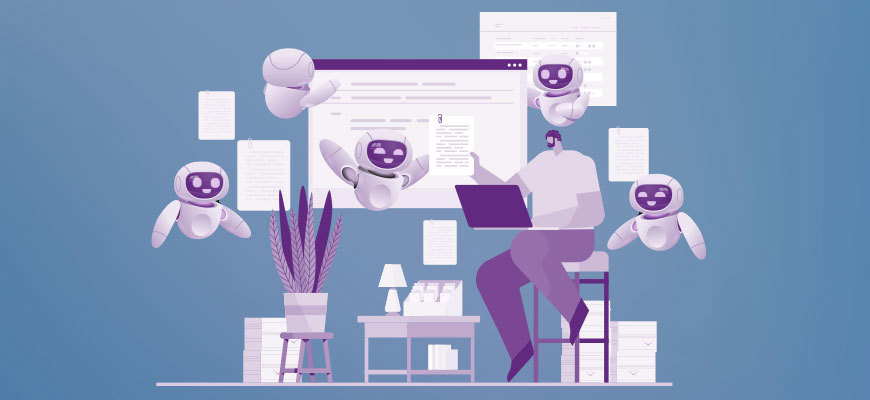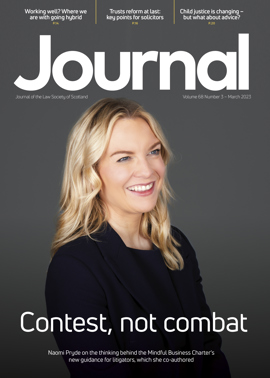The Eternal Optimist: When the chat gets serious

Apologies if you’ve heard it all before – the robots are coming blah blah, life as we know it is over blah blah, death of the high street etc etc. I’m old enough to have lived through most industry extinction events (and let’s be honest, few were as bad as forecast), but I do believe it is wise to keep an eye on the horizon not just for the threats but also for the opportunities that might be approaching.
Many of you I am sure will already be aware of a piece of software known as ChatGPT; for those of you that aren’t I suspect you will be seeing it a lot in the weeks and months ahead. This article though isn’t just about this one incredible piece of software – it’s also about the importance of being aware of what is happening not just in our own jurisdiction but in the world generally and how at times we can use it to our benefit.
Ask the expert
So what is ChatGPT? In brief, it is what we thought the internet was supposed to be. It’s an ability to interact conversationally with a computer, much as you would a human, and to access the answer that you need with incredible accuracy. Unlike Google, for example (who are more than a little concerned by this disrupter of their own long established dominance), it’s not a list of pre-ranked websites with potential answers, and it’s certainly not a list ranked in accordance with who has paid the most to be there. It is, quite simply, like asking a knowledgeable expert a question and them explaining to you, at a level appropriate to your choice, what the answer is.
Whether you are looking for a highly technical explanation on the chemical properties of lithium, or a short explanation of the Matrimonial Homes (Family Protection) (Scotland) Act 1981 in language suitable for a 10 year old, it will answer you accordingly. If you want to fine tune the response, just ask and it will make it shorter, longer, funnier or more technical. If you’d like the key points summarised, sure, no problem. In essence it’s the next level of AI (artificial intelligence), and you will be seeing AI in different contexts a lot in the near future as various companies race to work out how best to deploy this major leap forward.
Knowing (nearly) everything
The extent of ChatGPT’s knowledge and abilities in its current version is breathtaking. It should be: its source is pretty much everything accessible on the internet up to 2021 (updates coming will bring it right up to the current moment, more of which shortly). While I’ll focus on law and management in this piece, its impact on almost every element of society should not be underestimated. It can write fabulous code for computer programs; it can translate your letters and emails into almost any language; it can answer queries to a website like a receptionist; it can write blogs and articles (no doubt soon “in the style of the Eternal Optimist”); letters and emails and even speeches are all there to be used and adapted as required.
Scarier still, it is getting better at everything all the time. As we feed back to the system our own opinions on the accuracy or appropriateness of an answer, it learns. It’s not sentient, but it is able to crunch huge volumes of data (effectively our questions and feedback on the answers) to predict what the best possible answer to any request will be. Currently it is a text driven system, but it can be used in conjunction with speech recognition software to perform much like Alexa or Siri. Likewise, there are other versions of this form of AI that can generate art and music at a level well beyond anything that I would be capable of producing.
Ignore at your peril
“Thank you for the Tomorrow’s World piece,” I hear you say, “but we need to get back to billable work.” Understandable, and in the short term perhaps even sensible, but ignoring developments like these won’t make them go away, and worse still, opportunities and perhaps potential risks will be missed.
What might these be? On the positive side, it will be easier to prepare everything from blogs and articles to short explanations of long documents, as this software will take the heavy lifting out of these, leaving practitioners to simply check for inaccuracies and perhaps add in a little of their personality where required. Likewise it can assist in drafting some of the simpler correspondence, or particular elements of it (e.g. “explain the issues around planning permission in simple language”). Research will be easier in many areas, and ultimately there are bound to be legal issues arising from the use of this technology (copyright and plagiarism?), with perhaps new areas of law to explore for clients. These are just a few, and there are many, many smart practitioners out there who will see opportunities that I can’t imagine yet, never mind what others outwith our own profession might already be looking at.
Similarly, there are risks that we will all need to be aware of. No longer will we be able to identify scam emails by their poor use of language, as everyone can now draft the perfect letter. We will need to remain vigilant with our own staff and systems, as while ChatGPT is good and getting better, it isn’t yet perfect, and we still remain the ultimate arbiters of matters of law and best practice no matter how professional a piece might look. Similarly, clients will approach us even more often with flawed understandings of the law as they fail to ask the correct question of the system. Ultimately we ourselves might be the ones who require to develop the skill of framing how to address questions to this AI. There will also be those who will see this as yet another opportunity to try to erode our traditional markets or to take a larger market share within them.
Prize up for grabs
New waves of technology that change everything come along every decade or two, and those that take advantage of them reap the rewards. Web 2.0, for example, allowed firms to create new and better websites to reach out well beyond their normal geographical area and to offer and indeed capture new workflows and clients. The pandemic and our adoption of Zoom and Teams have likewise changed the way that we work forever, as did the wholesale migration onto PC-based systems after the Y2K fears. It’s seldom just about those with the deepest pockets, though: more often it’s about individuals within a practice unit taking the time to learn and to immerse themselves in what the new technology is all about and what it can do for them and their clients. The technology is there to be used; the question is, who will take up the challenge to use it?
We are already seeing the first tentative steps, as ChatGPT has sat and passed bar exams in the US, and indeed might be going on to assist in the first defence of a court case. Far more importantly, Microsoft has agreed a multi-billion dollar deal for ChatGPT to power its search engine Bing, which will no doubt, for a period at least, create huge waves for anyone using SEO, as Google’s dominance might at last be on the wane. This technology is, though, still inexpensive for most of us to use (it ranges from free to $20 per month for individuals), and can be incorporated into our own businesses at minimal cost. Likewise, for those who store enough well organised data (yes, I know that’s unlikely to be most legal firms), it will be possible to point the AI at your own system, have it learn your styles and culture, and then interact with your clients and provide responses like we would ourselves, based on our own styles and tone.
In the short term will things change? Yes, the effects are already being felt in teaching, where they are dealing with how to tell whether the student or the AI wrote the essay. For the legal profession I suspect it will be slower, but in the very short term the prize will go to who can best leverage this technology in areas like marketing and simple drafting. In the medium term, however, the genie is out of the bottle and it will grow fast. Billions of dollars are pouring into this technology and we will see improvements occurring even quicker than with any other recent technology. The only question now is, will we use it to our benefit or will we let others use it first to theirs?
Perspectives
Features
Briefings
- Civil court: No rule against redaction
- Corporate: Privileged or confidential – who can access
- Intellectual property: Big tech, AI and enforcement
- Succession: Non face-to-face will instructions; form C1
- Agriculture: “Route map” for agricultural reform
- Parking: About this ticket…
- In-house: Caring for the carers







